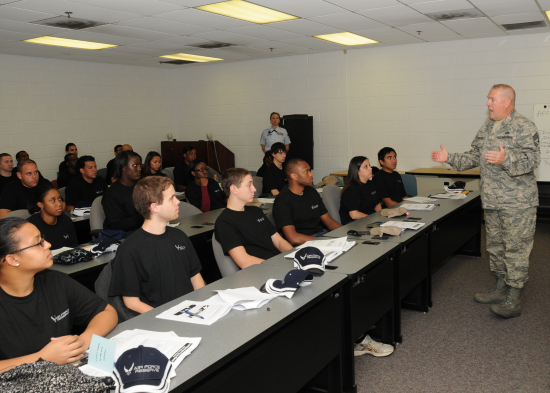The Air Force Delayed Entry Program (DEP) allows undecided people or those waiting to qualify for service to learn more about the Air Force and gain experience without a commitment to enlist.
Air Force DEP offers interested people the opportunity to go through basic training in addition to other responsibilities.
However, the person may decide to leave if they do not wish to enlist, for up to one year while in the program.
Here are eight things to know about the Air Force Delayed Entry Program.
Related Article – Delayed Entry Program (DEP) Guide
Table of Contents
#1. Purpose of the Air Force DEP

Some people may be reluctant to enlist in the U.S. Air Force as a result of uncertainty about what the experience and commitment to such service will entail.
In addition, there are people who may be considering a military career in the Air Force but are not yet qualified to enlist directly.
Some obstacles to qualification may be:
- Age (too young)
- Physical standards not met
- Education incomplete
- Other pending considerations
Therefore, the Air Force DEP is a program that offers people who are unsure about enlisting, or waiting to qualify, the chance to attend basic training and earn some experience in the Air Force branch.
Those who go through the DEP are not required to enlist or serve in the Air Force.
However, the program can provide an opportunity for overcoming qualification obstacles and meeting enlistment standards.
The DEP also offers a period of time for clarity and commitment for those who have a positive response to their introduction to the Air Force, along with the freedom to decide to become an Airman.
#2. How Air Force DEP Works
When someone joins the Air Force DEP, they indicate through signed papers their intention to attend Basic Military Training (BMT).
This represents a commitment to participating in this training.
After the papers are signed, the person will receive orders that state when they will attend Basic.
In addition, the DEP also provides those who have enlisted in the Air Force the chance to consider their commitment before they sign the actual papers to become an Airman.
It is important to understand the following principles regarding Air Force DEP:
- While in the program, members are not considered an official member of the Air Force
- Members are also not on active duty status while in the program
- DEP members are considered part of the Inactive Reserve of the Air Force
- During basic training, members will have trainee status and rank
#3. Air Force DEP Meetings

Air Force DEP meetings are led by a recruiter.
These meetings cover various topics and are usually held once or twice a month in the recruiter’s area.
All DEP members are required to attend these meetings and must notify the recruiter beforehand of any absences.
Members can expect to learn what to expect during the DEP and subsequent Air Force service.
This includes covering boot camp, basic training, and likely duties to be expected in the DEP.
In addition, the recruiter’s meetings will typically address what it is like to serve in the Air Force upon enlistment, including potential job duties, deployments, areas of service, and more.
Active duty Airmen and/or former Air Force service members may attend to give their perspectives and share their experiences.
DEP members can also expect to be measured and weighed during these meetings to ensure requirements are met.
This may also provide an opportunity for the recruiter to inquire about any life changes or other circumstances that would prevent enlisting in the Air Force.
Related Article – Entry Level Separation: 10 Things You Didn’t Know
#4. Standards Of Behavior While in Air Force DEP
Though joining the Air Force’s Delayed Entry Program does not guarantee that a person will enlist or become an Airman, it is still essential to uphold standards of behavior while in DEP.
These standards include abiding by the law and avoiding reckless behavior.
Therefore, DEP members should refrain from drug use, smoking, excessive drinking, etc.
Participating in such activities may jeopardize the chances of enlisting in the Air Force should this be the member’s choice.
You can expect to be randomly drug-tested while you’re in the DEP, so keep that in mind at all times!
#5. Benefits of DEP and Service in the U.S. Air Force

There are many benefits to becoming a member of the Air Force Delayed Entry Program.
This is especially true for people who are not certain about enlisting and/or pledging to spend a significant amount of time in the U.S. military as an Airman.
The DEP also offers prospective service members the chance to gain military experience while in the process of meeting standards and requirements for enlistment.
The DEP allows prospective enlistees the opportunity to go through Basic and receive military training as well as gain branch experience without the pressure of commitment to serve.
In addition, there are several benefits of serving in the Air Force, should the DEP member choose to enlist upon completion of basic training or thereafter.
Here are just some of these service benefits you’ll receive after completing basic training:
- Being part of proud military history
- Professional experience and job skills
- Health care
- Education benefits
- Travel opportunities
- Housing
- Retirement
#6. Participation in the DEP
Members of the Air Force DEP typically participate in meetings once or twice a month.
In addition, there are often duties related to the program, including classes and exercises that can assist future Airmen in achieving their goals and reaching the job position they want in the Air Force.
As time grows closer for participants to attend basic training, DEP members will have increased participation in the program.
For example, in the month before a participant is supposed to leave for basic training, the recruiter will most likely meet with them each week.
Related Article – What To Bring To Air Force Boot Camp
#7. Leaving Air Force DEP

Members of the Air Force DEP can remain in the program for up to one year.
Those who do not wish to enlist for active duty in the Air Force by the year’s end can simply exit the DEP without enlisting.
Members of the DEP can also exit the program up until graduation from basic training.
Called an Entry Level Separation, this type of separation allows those in the DEP to discharge from the Air Force within the first 180 days.
It is important to clearly inform your recruiter or commanding officer of your decision to leave the Air Force Delayed Entry Program.
There may be some pressure from recruiters and Air Force members to encourage a DEP member to stay and enlist.
This is often because the service views members of the DEP as investments of their time and effort, preferring not to take a loss.
However, nobody in the Delayed Entry Program can be forced to continue being a member and they cannot be made to enlist.
Related Article – Future Soldier Program: Complete Guide
#8. Is the DEP Offered By Other Branches?
Each branch of the U.S. military features a form of delayed entry or enlistment program, including the Army, Navy, Marine Corps, and Coast Guard as well as the Air Force.
These programs are effective in that they allow potential future service members the chance to prepare for and carefully consider joining a branch of the military.
Enlistment in the Air Force, or any other branch of the Armed Forces, is a significant commitment that brings life-changing transitions.
Therefore, delayed entry programs such as the Air Force DEP offer a cushion of time and experience to make an informed decision about military service.
In addition, there is no contractual obligation to enlist for members of these programs, so the decision can be made at a truly voluntary level.
Overall, this enhances the strength of each branch and its service members.
Featured Image – www.GetArchive.net
- Replacing Dog Tags: 6 Things You Need to Know - June 28, 2024
- Navy OAR Test Study Guide - June 24, 2024
- 10 Best Sniper Movies of all Time - June 20, 2024
Originally posted on November 26, 2022 @ 6:27 am
Affiliate Disclosure: This post may contain affiliate links. If you click and purchase, I may receive a small commission at no extra cost to you. I only recommend products I have personally vetted. Learn more.

